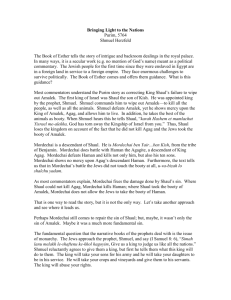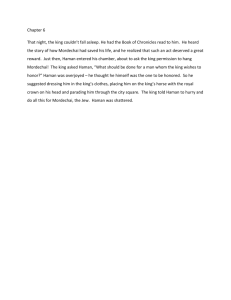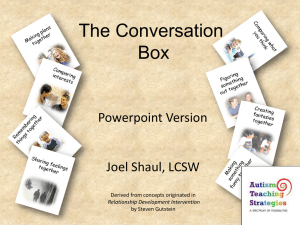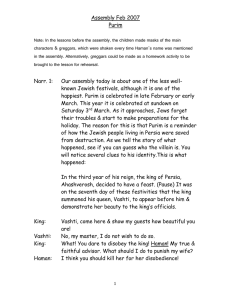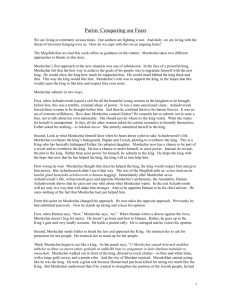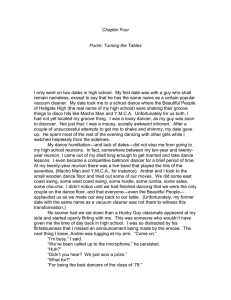Purim 3
advertisement
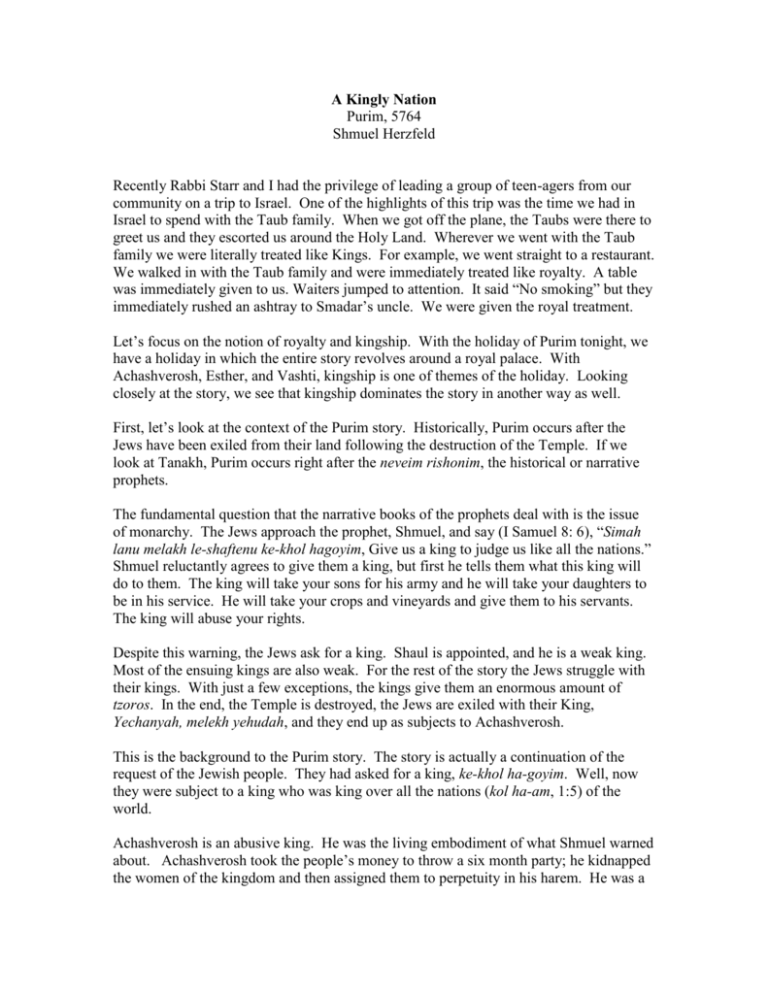
A Kingly Nation Purim, 5764 Shmuel Herzfeld Recently Rabbi Starr and I had the privilege of leading a group of teen-agers from our community on a trip to Israel. One of the highlights of this trip was the time we had in Israel to spend with the Taub family. When we got off the plane, the Taubs were there to greet us and they escorted us around the Holy Land. Wherever we went with the Taub family we were literally treated like Kings. For example, we went straight to a restaurant. We walked in with the Taub family and were immediately treated like royalty. A table was immediately given to us. Waiters jumped to attention. It said “No smoking” but they immediately rushed an ashtray to Smadar’s uncle. We were given the royal treatment. Let’s focus on the notion of royalty and kingship. With the holiday of Purim tonight, we have a holiday in which the entire story revolves around a royal palace. With Achashverosh, Esther, and Vashti, kingship is one of themes of the holiday. Looking closely at the story, we see that kingship dominates the story in another way as well. First, let’s look at the context of the Purim story. Historically, Purim occurs after the Jews have been exiled from their land following the destruction of the Temple. If we look at Tanakh, Purim occurs right after the neveim rishonim, the historical or narrative prophets. The fundamental question that the narrative books of the prophets deal with is the issue of monarchy. The Jews approach the prophet, Shmuel, and say (I Samuel 8: 6), “Simah lanu melakh le-shaftenu ke-khol hagoyim, Give us a king to judge us like all the nations.” Shmuel reluctantly agrees to give them a king, but first he tells them what this king will do to them. The king will take your sons for his army and he will take your daughters to be in his service. He will take your crops and vineyards and give them to his servants. The king will abuse your rights. Despite this warning, the Jews ask for a king. Shaul is appointed, and he is a weak king. Most of the ensuing kings are also weak. For the rest of the story the Jews struggle with their kings. With just a few exceptions, the kings give them an enormous amount of tzoros. In the end, the Temple is destroyed, the Jews are exiled with their King, Yechanyah, melekh yehudah, and they end up as subjects to Achashverosh. This is the background to the Purim story. The story is actually a continuation of the request of the Jewish people. They had asked for a king, ke-khol ha-goyim. Well, now they were subject to a king who was king over all the nations (kol ha-am, 1:5) of the world. Achashverosh is an abusive king. He was the living embodiment of what Shmuel warned about. Achashverosh took the people’s money to throw a six month party; he kidnapped the women of the kingdom and then assigned them to perpetuity in his harem. He was a king who made evil decrees and invented harsh, new laws. He was a cruel, calculating king. The Jewish people told Shmuel, ve-hayinu gam anakhnu ke-khol ha-goyim, we want to be just like all the nations. Be careful what you ask for, because this is exactly what they got. They were now in a secular kingdom being ruled over by a king who was ruler of all the nations. The great mistake that the Jewish people made—the mistake that led to their exile—was that they asked for a king like all of the nations. The first king they appointed was Shaul. Mordechai’s role as a descendant of Shaul was to reverse this giant mistake. Consider the following: Mordechai is in many ways the anti-king. He is the gadfly. He is the political outsider who sits at the gate of the king. He refuses to listen to the king and publicly violates his commandments (over et mitzvat hamelekh, 3:3). He is much smarter than the king and in fact the king owes his life to him. Mordechai is offered the opportunity to join the royal palace. Esther sends garments to clothe Mordechai, va-tishlach begadim le-halbish et Mordechai. In the Bible to dress someone in garments is a sign of kingship. Esther wants Mordechai to become a king or a prince. Instead, Mordechai willingly tears his garments. Tearing garments in the Bible is a symbol of losing royal power. Mordechai disdains the kingship; he wants no part of it. Even at the end of the story when he becomes powerful, Mordechai still has no interest in setting up his own kingdom. Shaul is ultimately replaced by David; Mordechai is also figure who replaces Shaul. In fact, Mordechai is described as dod Esther, the uncle of Esther; but the word dod (daled vav daled) is sometimes spelled exactly the same way as the word David. Mordechai is the David-like savior who has arrived on the scene to replace Shaul. He has come to clean up the great mistake of the Jewish people. The Jewish people had said, we want to be ke-hol ha-goyim, like all the nations. We are not like all the nations. We have our own mission and our own responsibilities. We should not judge ourselves by the standards of others. Mordechai said, we should not be ke-khol hagoyim, but or lagoyim, a light onto the nations. Not like all the nations, but a light onto the nations. Layehudim haitah orah, From the Jews there was light. How can we spread this light? How can we fulfill the mandate of being an or lagoyim? Returning to the question of monarchy: What was so bad about wanting a king? Before the Jews entered the land of Israel, God made two promises to us. The first promise is that we will inherit a land flowing with milk and honey, eretz zavat chalav u-devash. This represents the riches of the land; the material possessions of the land will be plentiful. The second promise is, atem tehiyun li mamlechet kohanim, we will be a nation of mamlechet kohanim—a kingdom of priests. The first promise is really contingent upon the second. God promises us the riches of the land, only if we will be a kingdom of priests. We can’t have one melekh, who alone bears the responsibility to serve God. Each of us must be a king. The mistake in asking for a king was that we were abdicating our responsibility as a kingdom of priests. The commandment from God is that each of us must take our responsibilities to the Jewish people and to the world as seriously as if we ourselves were king over the nation. That’s what it means to be a mamlechet kohanim. In these times, especially as Jews living in America, we have to feel this responsibility. On our trip to Israel, we saw a land full of richness. There was chalav u-devash. But we also saw many people who were taking this challenge of mamlechet kohanim seriously and acting like kings. We went inside a tank. I had no idea of the difficulty and skill involved in serving in a tank. To see it for the first time is to be moved beyond words. To serve in a tank on behalf of Israel is to fulfill the commandment of mamlechet kohanim. We saw forty year old reservists conducting live exercises as they were preparing to depart for Gaza in just a few hours. These were people with families, good jobs, accomplished lives, who were willingly entering into a war zone. That’s what it means to be a mamlechet kohanim. It means recognizing that it is our responsibility to act as kings over our nation. We spent Shabbat with the group in Jerusalem. That Shabbat we walked up and down emek refaim enjoying the beauty and the serenity of a Shabbat in Jerusalem. As we got off the plane in Newark the next morning, we heard the news. On the very spot where we had twice walked the day before, there had been a terrible bombing. Teen-agers the same age as our own were killed. It is our responsibility to serve the Jewish people. The message of Purim is that as Jews we are all in this together. Consequently, each and every one of us has to be a king for our people.
